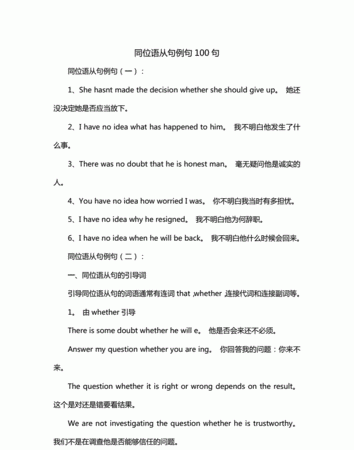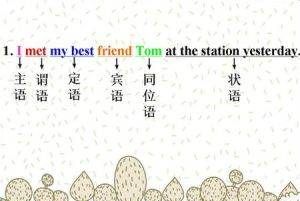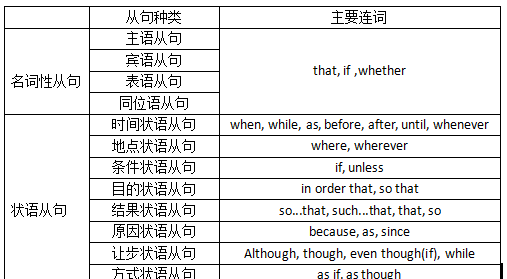本文目录
简单同位语例句100句
同位语从句
如果一个句子去掉其中的关系代词,这个句子是完整的2个单独的句子,这样的句子就是同位语从句
如果去掉关系代词,不是两个完整的句子,那这样的句子是宾语从句
There is a little hope that she will recover.
在fact,idea,news,word,information,thought, believe等词后面的名词性从句通常都是同位语从句. that不做成分但关系代词不可以省略.
No one could account for for the fact that one of the boxes was extremely heavy.
The fact that his proposal make sense should recognized.
We must face the fact that we might lose our deposit./money
The idea that number “13” brings bad luck seems to be quite absurd.

同位语的例句
⒈由两个或两个以上同一层次的语言单位组成的结构,其中前项与后项所指相同,句法功能也相同,后项是前项的同位语。
Mr. Smith,our new teacher,is very kind to us.
我们的新老师史密斯先生对我们很好。
our new teacher是主词Mr. Smith的同位语,指同一人。
Yesterday I met Tom,a friend of my brother's.
昨天我遇到了我弟弟的朋友汤姆。
a friend of my brother's是受词Tom的同位语,指同一人。
⒉如同位语与其同位成分关系紧密时不用逗点隔开;如同位语对其同位成分只作补充解释时可用逗点隔开。
He himself told me that his brother John is a world-famous doctor.
他本人对我讲,他的兄长约翰是一位世界闻名的医生。
himself和John都是单一的字作同位语,与其同位成分之间不用逗点隔开。
Yesterday I talked to my English teacher,Mr. James.
昨天我与我的英语老师詹姆斯先生谈过了。
同位语Mr. James补充解释my English teacher,同位语与其同位成分之间可用逗点隔开。
⒊同位语除表示其同位成分的全部意义外,还可以表示部分意义。
We Chinese people are brave and hardworking.
我们中国人民是勤劳勇敢的。
He is interested in sports,especially ball games.
他喜欢运动,特别是球类运动。
同位从句一般跟在某些名词如answer(答案),hope(希望),fact(事实),belief (信仰),news(消息),idea(主意;观念),promise(承诺),information(信息),conclusion(结论),order(命令), suggestion(建议),problem(问题),thought (想法)等后面。例如:He always works hard even if he knows the fact that he is not in good health. His failure was due to the fact that he had not practised for a long time. I had no idea that you were here. She told us her hope that she would become a pianist. He made a promise that he would never come late. 注意:that 既可引导同位语从句又可引导定语从句,其区别在于:同位语从句由连接词that引导,连接词that本身无意义,在同位语从句中不充当任何成分,不可省略,不可以用其他词替代;定语从句由关系代词that引导,关系代词that在从句中充当一定的成分,作宾语时可省略,由when,why,where引导的 同位语从句和定语从句的区别在于:同位语从句由连接副词只起连接作用,没有指代作用; 定语从句由关系副词引导,关系副词具有指代先行词的作用,常用一个介词加关系代词替换。例如:I will never forget the day when we first met. (定语从句,when关系副词) That is the special day (which/that) I will never forget. (定语从句,which/that为关系代词) This is the house where we lived fifteen years ago. (定语从句,where为关系副词) This is the house which we sold fifteen years ago. (定语从句,which为关系代词)

什么是同位语从句英语语法
关于同位语从句的英语语法
1.同位语从句:whether

whether可以引导同位语从句,而定语从句不能用whether作为引导词。
He hasn’t made the decision whether he will go there.
他还没有做出决定是否去那里。
I have small doubt whether he is suitable for the job.
他是否适合这件工作我有点怀疑。
2.同位语从句:that
些名词的后面可以接that引导的同位语从句:
We came to the decision that we must act at once. 我们做出决定:我们必须立即行动。
He made a proposal that the meeting be postpone. 他提议会议延期。
There was little hope that he would survive. 他幸存的希望很小。
在非正式语体中that可以省略。
以下名词常用于以上句型:
advice, announcement, argument, belief, claim, conclusion, decision, evidence, explanation, fact, feeling, hope, idea, impression, information, knowledge, message, news, opinion, order, probability, promise, proposal, remark, reply, report, saying, statement, suggestion, thought, treat, warning, wish, word
3.同位语从句:what
what可以引导同位语从句,而定语从句不能用what作为引导词
I have no idea what he is doing now. 我不知道他现在在干什么。
4.同位语从句:how
how可以引导同位语从句,而定语从句不能用how作为引导词
It’s a question how he did it. 那是一个他如何做了此事的`问题。
5.同位语从句:who等
who, whom, which, when, where, why用来引导同位语从句
The question who should do the work requires consideration.
谁该干这项工作,这个问题需要考虑。
She raised the question where we could get the fund.
她提出这个问题:我们到哪儿去搞这笔资金。
6.同位语从句和定语从句的区别
1)同位语从句和先行词是同等的关系;而定语从句是用来修饰先行词,是从属的关系。
2)that在同位语从句中没有词义,不充当句子成分;而在定语从句中充当主语、宾语等句子成分。
3)whether, what, how可以用来引导同位语从句;而它们不能用来引导定语从句。
;同位语的具体用法和例句分析法
同位语概念:一个名词(或其它形式)对另一个名词或代词进行解释或补充说明,这个名词(或其它形式)就是同位语。
例句:The report that he was going to resign was false.(他将辞职的报道是假的。)在此句中,that he was going to resign就是对report内容的说明,因此that引导的就是同位语从句。
The news that he won the match is so exciting.他赢得比赛的消息是如此的振奋人心。
这里that引导的从句做的就是同位语从句。因为that引导的从句就是the news的内容,是对the news 的进一步阐释,所以是同位语从句。
但是很多人很容易将同位语从句和定语从句搞混,请看下面的例句。
He is the man whom/ that I saw yesterday. 他就是我昨天见的那个人。
whom/that引导的从句在此句中引导的就是定语从句。从句和he的关系是从句对he进行限制,哪个he,昨天我见到的那个he.所以,只有汉语意思分析出来的话,就很好判断了。

扩展资料
用法
一个名词(或其它形式)对另一个名词或代词进行修饰,限定或说明,这个名词(或其它形式)就是同位语。
同位语与被它限定的词的格式要一致,并常常紧挨在一起。
同位语从句即重复说明同一个称谓或事件的从句。
名词作同位语
Mr Wang,my child’s teacher,will be visiting us on Tuesday.
王先生,我孩子的老师,星期二要来看我们。
(在这里'my child's teacher'做同位语修饰'Mr Wang')
短语作同位语
I,the oldest girl in the family,always had to care for the other children.
我,作为家里最大的女孩,总是要照料家中的其他孩子。
直接引语作同位语
But now the question comes to their minds,“Did she die young because she was a clone?”
但是现在他们不得不思考这样的问题:“多莉早死是因为它是一只克隆羊吗?”
句子作同位语
The girls were surprised at the fact that ocean ships can sail up the Great lakes.
巨大的海轮可以开到五大湖,让表姐妹俩感到吃惊。
固定用法
同位语部分是个句子,就是同位语从句,这种用法比较"固定"
一、在复合句中用作同位语的从句叫同位语从句。它一般跟在某些名词后面,用以说明该名词表示的具体内容。
I heard the news that our team had won.
我听到了我们队获胜的消息。
二、可以跟同位语从句的名词通常有news,idea,fact,promise,question,doubt,thought,hope,message,suggestion,words(消息),possibility,decision等(一般的“抽象”名词都可用)。
I’ve come from Mr wang with a message that he won’t be able to see you this afternoon.
我从王先生那里来,他让我告诉你他今天下午不能来看你了。
三、英语中引导同位语从句的词通常有连词that,whether,连接代词what,who。连接副词how,when,where等。(注:if不能引导同位语从句。)
He must answer the question whether he agrees with it or not.
他必须回答他是否同意这样一个问题。
四、有时同位语从句可以不紧跟在说明的名词后面,而被别的词隔开。
The thought came to him that maybe the enemy had fled the city.
他突然想起敌人可能已经逃出城了。
参考资料:百度百科 同位语从句
以上就是关于同位语的英语例句 ,简单同位语例句100句的全部内容,以及同位语的英语例句 的相关内容,希望能够帮到您。
